More than 40 Tuareg were killed in two attacks blamed on jihadists on Mali’s northeastern border with Niger, sources said, while Burkina Faso authorities arrested around 100 people and seized explosives in operations near its Mali border.
“There have been 43 deaths in two days, all civilians, from the same community,” tribal leader Sidigui Ag Hamadi told AFP from the regional capital Menaka.
“Our fighters are destroying their bases and wiping them out. They are targeting innocent civilians,” he added, seeing the bloodletting as reprisals for attacks on jihadists by armed Tuarag groups.
The Movement for the Salvation of Azawad, a former Tuareg rebel group, said in a Friday Facebook post that 43 people had been killed in two raids. All the victims were from the Idaksahak pastoralist berber group.
Menaka governor Daouda Maiga urged caution regarding the death toll until official observers had arrived on the scene.
“There are various versions, but I know there are women and childen among the victims, as well as elderly,” Maiga told AFP.
Local people had been fearful of reprisals by jihadists who suffered major losses in recent attacks in the region over recent weeks, Menaka official Attaye Ag Ossadki told AFP.
“But nobody imagined that they would kill civilians in this way,” he said.
Twelve Tuareg were killed in a Thursday attack on the Aklaz encampments, and 31 were killed in Awakassa on Friday, both in a region where unrest between jihadists and two Tuareg-led armed groups is common.
Little information is available about Friday’s attack.
On Thursday, 16 gunmen appeared on motorbikes outside the town of Anderamboukane and “opened fire on civilians,” according to statements from the Tuareg groups, the pro-government Gatia, and the MSA.
“Among the victims are young children and elderly people,” they added.
A Mali official source speaking on condition of anonymity confirmed the death toll to AFP.
Kibaru reported reliable sources as saying armed individuals took unarmed civilians from their tents before executing them automatic weapons.
MSA said a patrol chased the assailants, and had placed four “out of harm’s way” and captured weapons and motorbikes from the attackers. One MSA fighter was killed, the group said.
Sources from the U.N.’s Minusma peacekeeping mission said on April 12 they had received “very serious” information that “summary executions of at least 95 people” had occurred during anti-jihadist operations in the northeastern Menaka region carried out by “a coalition of armed groups” including Gatia and MSA.
Both groups denied a claim they dubbed “scandalous and outrageous.”
The recent unrest in Mali began with a 2012 Tuareg separatist uprising against the state, which was exploited by jihadists linked to al-Qaeda who took key cities in the north.
The insurgency has gradually spread to the country’s center, where local grievances are sometimes exploited by radical Islamists in a region awash with guns. The groups have morphed into more nimble formations operating in rural areas, sometimes winning over local populations by providing basic services and protection from bandits.
In June 2015, Mali’s government signed a peace agreement with some armed groups, but other jihadists remain active, and large tracts of the country remain lawless.
France launched an intervention in its former colony in 2013. That mission evolved into the current Operation Barkhane deployment launched in 2014 with an expanded mandate for counter-terror operations across the Sahel region of West Africa, and around 4,000 French troops are deployed.
The U.N.’s Minusma peacekeeping force has around 12,000 military and 1,900 police personnel deployed from 57 U.N. partner nations, and the mission is considered the U.N.’s most dangerous.
Minusma said it had recorded at least 85 major violent incidents and armed confrontations that resulted in at least 180 civilian victims since the beginning of the year.
More than seven U.N. peacekeepers have been killed in attacks in Mali this year alone. In the days prior to the Timbuktu attack, one U.N. peacekeeper from Niger was shot dead in northern Mali and in a separate attack, two U.N. peacekeepers were killed and 10 wounded by mortars in the country’s northeast.
More than 160 peacekeepers have died since the Minusma deployment began in 2013.
Meanwhile, in an initiative was spearheaded by France, Burkina Faso, Chad, Mali, Mauritania and Niger set up the 5,000-strong G5 Sahel joint counter-terrorism force that aims to train 5,000 troops to work alongside the French troops and the U.N. The group is currently supported by France, the U.S., and the European Union among others.
Vast stretches of the country remain out of the control of Malian, French, G5 Sahel and U.N. forces, which are frequent targets of attacks.
100 arrested, explosives seized in Burkina Faso raids
Meanwhile, Burkinabe authorities have arrested around 100 people and seized explosives in operations in eastern and northern regions near the Malian border where jihadists are active, the chief of army staff said Saturday.
“From April 19 to 27 the armed forces carried out operations to cordon off the northern border, leading to the arrest of 100 suspects including sought individuals as well as the neutralisation of explosives,” an army statement said.
“The same kind of operation was carried out in the east in the forests of Nakortougou and Foutouri,” it said.
Burkina Faso’s border regions with Mali and Niger have both been the scene of regular attacks by jihadist groups over the past three years. Official figures say 89 ambushes have left 134 people dead.
Security sweeps of the areas by specialist anti-terrorist units since the end of last year had already led to the arrest of 30 people suspected to have links with extremist groups, according to the military.
With reporting from AFP


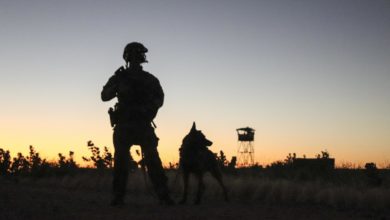

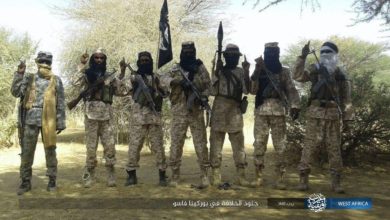

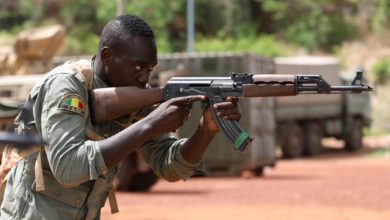
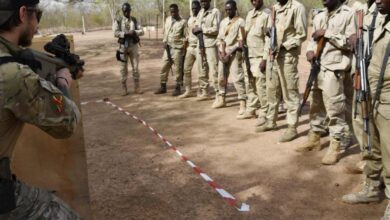
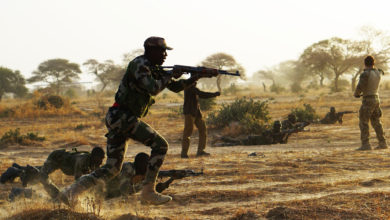
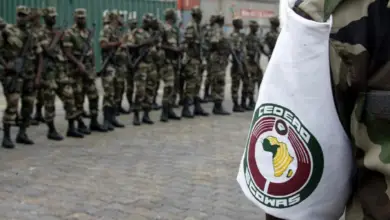

One Comment